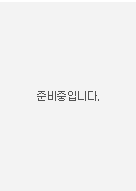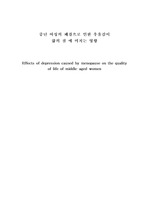

PARTNER
검증된 파트너 제휴사 자료
중년기 성인의 노화불안과 영향요인 (Aging Anxiety and Related Factors of Middle-Aged Adults)
한국학술지에서 제공하는 국내 최고 수준의 학술 데이터베이스를 통해 다양한 논문과 학술지 정보를 만나보세요.
9 페이지
최초등록일 2025.02.12
최종저작일
2013.08

-
서지정보
· 발행기관 : 한국성인간호학회
· 수록지 정보 : Korean Journal of Adult Nursing / 25권 / 4호 / 464 ~ 472페이지
· 저자명 : 서순림, 최희정
초록
Purpose: The purpose of this study was to identify aging anxiety and influencing factors of middle-aged adults.
Methods: Descriptive correlation design was used. Three hundred and three middle-aged adults participated in the study and completed the questionnaires in the period from September 11 to October 15 of 2011. The data was analyzed using independent t-test, one-way ANOVA, Scheffé test, Pearson correlation coefficients, and hierarchial multiple regression analysis. Results: Aging anxiety of middle-aged adults was higher than a moderate level. Socio-demographic variables such as age, religion, education, economic level, perceived health status and experience of living with older adults influenced significantly on aging anxiety. In contrast, general self-efficacy,aging knowledge and attitude toward older adults were negatively correlated with aging anxiety. Hierarchial multiple regression analysis incorporating these variables showed an explanation rate of aging anxiety at 21%. And religion, perceived health status, attitude toward older adults, and general self-efficacy were statistically significant among variables that influence on aging anxiety. Conclusion: The findings of this study suggest that senior preparation programs that can enhance self-efficacy, induce positive attitude on older adults and promote health should be implemented to reduce aging anxiety of middle-aged adults.영어초록
Purpose: The purpose of this study was to identify aging anxiety and influencing factors of middle-aged adults.
Methods: Descriptive correlation design was used. Three hundred and three middle-aged adults participated in the study and completed the questionnaires in the period from September 11 to October 15 of 2011. The data was analyzed using independent t-test, one-way ANOVA, Scheffé test, Pearson correlation coefficients, and hierarchial multiple regression analysis. Results: Aging anxiety of middle-aged adults was higher than a moderate level. Socio-demographic variables such as age, religion, education, economic level, perceived health status and experience of living with older adults influenced significantly on aging anxiety. In contrast, general self-efficacy,aging knowledge and attitude toward older adults were negatively correlated with aging anxiety. Hierarchial multiple regression analysis incorporating these variables showed an explanation rate of aging anxiety at 21%. And religion, perceived health status, attitude toward older adults, and general self-efficacy were statistically significant among variables that influence on aging anxiety. Conclusion: The findings of this study suggest that senior preparation programs that can enhance self-efficacy, induce positive attitude on older adults and promote health should be implemented to reduce aging anxiety of middle-aged adults.참고자료
· 없음태그
-
자료후기
-
자주묻는질문의 답변을 확인해 주세요

꼭 알아주세요
-
자료의 정보 및 내용의 진실성에 대하여 해피캠퍼스는 보증하지 않으며, 해당 정보 및 게시물 저작권과 기타 법적 책임은 자료 등록자에게 있습니다.
자료 및 게시물 내용의 불법적 이용, 무단 전재∙배포는 금지되어 있습니다.
저작권침해, 명예훼손 등 분쟁 요소 발견 시 고객센터의 저작권침해 신고센터를 이용해 주시기 바랍니다. -
해피캠퍼스는 구매자와 판매자 모두가 만족하는 서비스가 되도록 노력하고 있으며, 아래의 4가지 자료환불 조건을 꼭 확인해주시기 바랍니다.
파일오류 중복자료 저작권 없음 설명과 실제 내용 불일치 파일의 다운로드가 제대로 되지 않거나 파일형식에 맞는 프로그램으로 정상 작동하지 않는 경우 다른 자료와 70% 이상 내용이 일치하는 경우 (중복임을 확인할 수 있는 근거 필요함) 인터넷의 다른 사이트, 연구기관, 학교, 서적 등의 자료를 도용한 경우 자료의 설명과 실제 자료의 내용이 일치하지 않는 경우
“Korean Journal of Adult Nursing”의 다른 논문도 확인해 보세요!
-
구조화된 수술 전 교육이 백내장 수술 환자의 불안과 자가간호 수행에 미치는 효과 10 페이지
Purpose: The purpose of this study was to investigate the effects of a structured preoperative instruction upon anxiety and postoperative self-care compliance. Methods: A randomized control group pre-.. -
요부운동 프로그램이 경막외 신경차단술을 받은 만성요통 환자의 통증, 일상생활제한 및 우울 감소에 미치는 효과 10 페이지
Purpose: This study aimed to evaluate the effects of exercise program on chronic low back pain, daily living disability and depression in chronic low back pain patients treated with epidural injection.. -
중환자실 환자의 경관영양 공급시기에 따른 영양섭취양상: 예비연구 10 페이지
Purpose: The purpose of this study was to describe the differences between early and delayed enteral nutrition on nutritional intake. Methods: A pilot cohort study was conducted with 45 critically ill.. -
사무직 남성 근로자의 이상지질혈증과 고혈압 영향 요인 12 페이지
Purpose: The purpose of this study was to investigate the factors related to dyslipdemia and hypertension among male office workers. Methods: This study was a cross-sectional survey. The sample was 20.. -
영·유아 자녀를 둔 베트남 결혼이주여성을 위한 감염예방교육 프로그램의 효과 10 페이지
Purpose: This study was conducted to examine the impact of infection prevention program on the knowledge and performance among married Vietnamese immigrant women an infant or child. Methods: A non-equ..
-
회원가무료
-
지식판매자한국학술지 P
-
페이지9 페이지
기타파일
-
최초등록일2025.02.12
-
최종저작일2013.08
-
찾으시던 자료가 아닌가요?
지금 보는 자료와 연관되어 있어요!
문서 초안을 생성해주는 EasyAI




